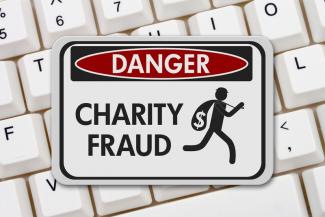Beware of COVID-Related Charity Scams
Making charitable donations to help others can be very rewarding. Especially now, many Americans are admirably trying to help those impacted by the COVID-19 crisis through charitable donations. Many of these charities live up to their fundraising promises, but others are the work of scammers attempting to exploit this tragedy for personal gain.
OAG is committed to protecting District residents from fraudulent charitable solicitations by helping residents spot scammers and, if necessary, pursuing legal action against bad actors.
If you are considering donating to a charity, here are some tips to keep in mind:
- Be wary of charitable organizations or crowdfunding campaigns that only recently launched in response to these events. Many are formed by scammers in the wake of the COVID-19 pandemic.
- Ask questions—a legitimate charity, even if formed in response to COVID-19, should be able to provide you with their name, address, telephone number, mission, how the donation will be used, and the percentage of your donation that will go to the charity.
- Be especially vigilant before giving donations through peer-to-peer or social networking websites, as it is difficult to verify that your donation will be used properly. This includes texts or messages you might receive online.
- Never donate using cash, gift card, or wire transfer (or to an organization that offers to send a courier to your location to pick up a check or cash). Use a credit card whenever possible.
- Remember that an organization is not authentic just because it uses words like “COVID-19” or “coronavirus” in its name or has reputable looking seals or logos.
Take some additional steps before making a charitable donation:
- Research a charity online through online independent sources like IRS Select Check, BBB Wise Giving Alliance, Charity Navigator, GuideStar, and the National Center for Charitable Statistics.
- Although some charities are exempt by District statute and regulation from the requirement that they hold a charitable solicitation license, you can search and verify if a particular charity holds a charitable solicitation license:
- Contact the District of Columbia Department of Consumer and Regulatory Affairs,: (202) 442-4400
- Use DCRA’s Scout Portal at https://scout.dcra.dc.gov/login
- Search the charity’s name online with the words “scam” or “complaint.” See what other people say about it.
If you believe you have been the victim of fraud or encountered a fraudulent solicitation, report to OAG:
- Call the Consumer Protection Hotline at (202) 442-9828
- Emailing Consumer.Protection@dc.gov
- Submitting a complaint online at oag.dc.gov/consumercomplaint.
The Office of the Attorney General works to educate District residents about their consumer rights, responds to individual consumer complaints, and takes appropriate law enforcement action when possible. Learn more about your rights and how to protect yourself against scams at oag.dc.gov/ConsumerProtection.

